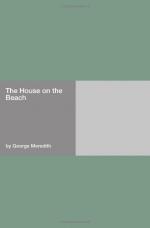He went to the seaward gate of the house on the beach, made practicable in a low flint wall, where he was met by his sister Martha, to whom he handed the basket. Apparently he named the cost of his purchase per dozen. She touched the fish and pressed the bellies of the topmost, it might be to question them tenderly concerning their roes. Then the couple passed out of sight. Herrings were soon after this despatching their odours through the chimneys of all Crikswich, and there was that much of concord and festive union among the inhabitants.
The house on the beach had been posted where it stood, one supposes, for the sake of the sea-view, from which it turned right about to face the town across a patch of grass and salt scurf, looking like a square and scornful corporal engaged in the perpetual review of an awkward squad of recruits. Sea delighted it not, nor land either. Marine Parade fronting it to the left, shaded sickly eyes, under a worn green verandah, from a sun that rarely appeared, as the traducers of spinsters pretend those virgins are ever keenly on their guard against him that cometh not. Belle Vue Terrace stared out of lank glass panes without reserve, unashamed of its yellow complexion. A gaping public-house, calling itself newly Hotel, fell backward a step. Villas with the titles of royalty and bloody battles claimed five feet of garden, and swelled in bowwindows beside other villas which drew up firmly, commending to the attention a decent straightness and unintrusive decorum in preference. On an elevated meadow to the right was the Crouch. The Hall of Elba nestled among weather-beaten dwarf woods further toward the cliff. Shavenness, featurelessness, emptiness, clamminess scurfiness, formed the outward expression of a town to which people were reasonably glad to come from London in summer-time, for there was nothing in Crikswich to distract the naked pursuit of health. The sea tossed its renovating brine to the determinedly sniffing animal, who went to his meals with an appetite that rendered him cordially eulogistic of the place, in spite of certain frank whiffs of sewerage coming off an open deposit on the common to mingle with the brine. Tradition told of a French lady and gentleman entering the town to take lodgings for a month, and that on the morrow they took a boat from the shore, saying in their faint English to a sailor veteran of the coastguard, whom they had consulted about the weather, “It is better zis zan zat,” as they shrugged between rough sea and corpselike land. And they were not seen again. Their meaning none knew. Having paid their bill at the lodging-house, their conduct was ascribed to systematic madness. English people came to Crikswich for the pure salt sea air, and they did not expect it to be cooked and dressed and decorated for them. If these things are done to nature, it is nature no longer that you have, but something Frenchified. Those French are for trimming Neptune’s beard! Only




